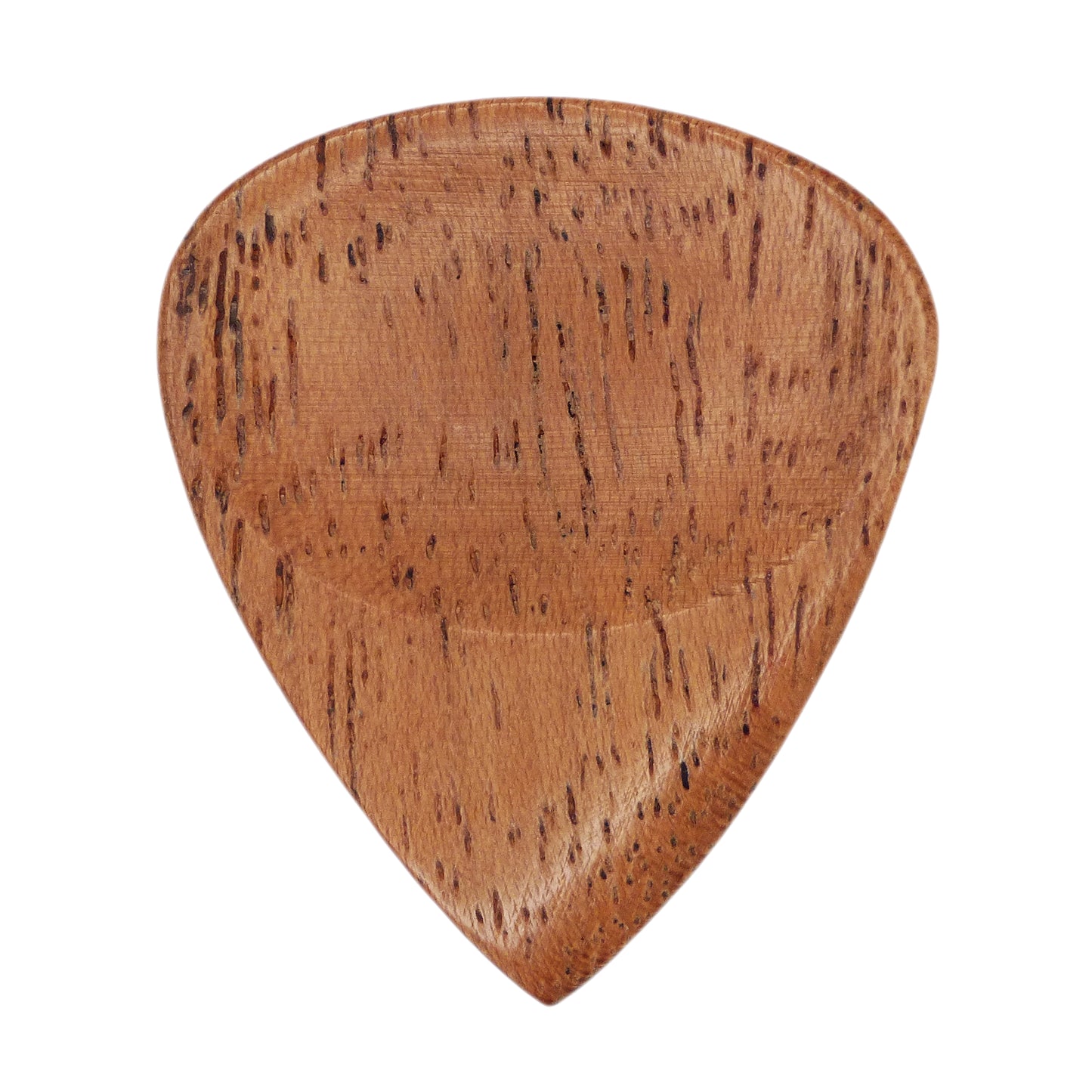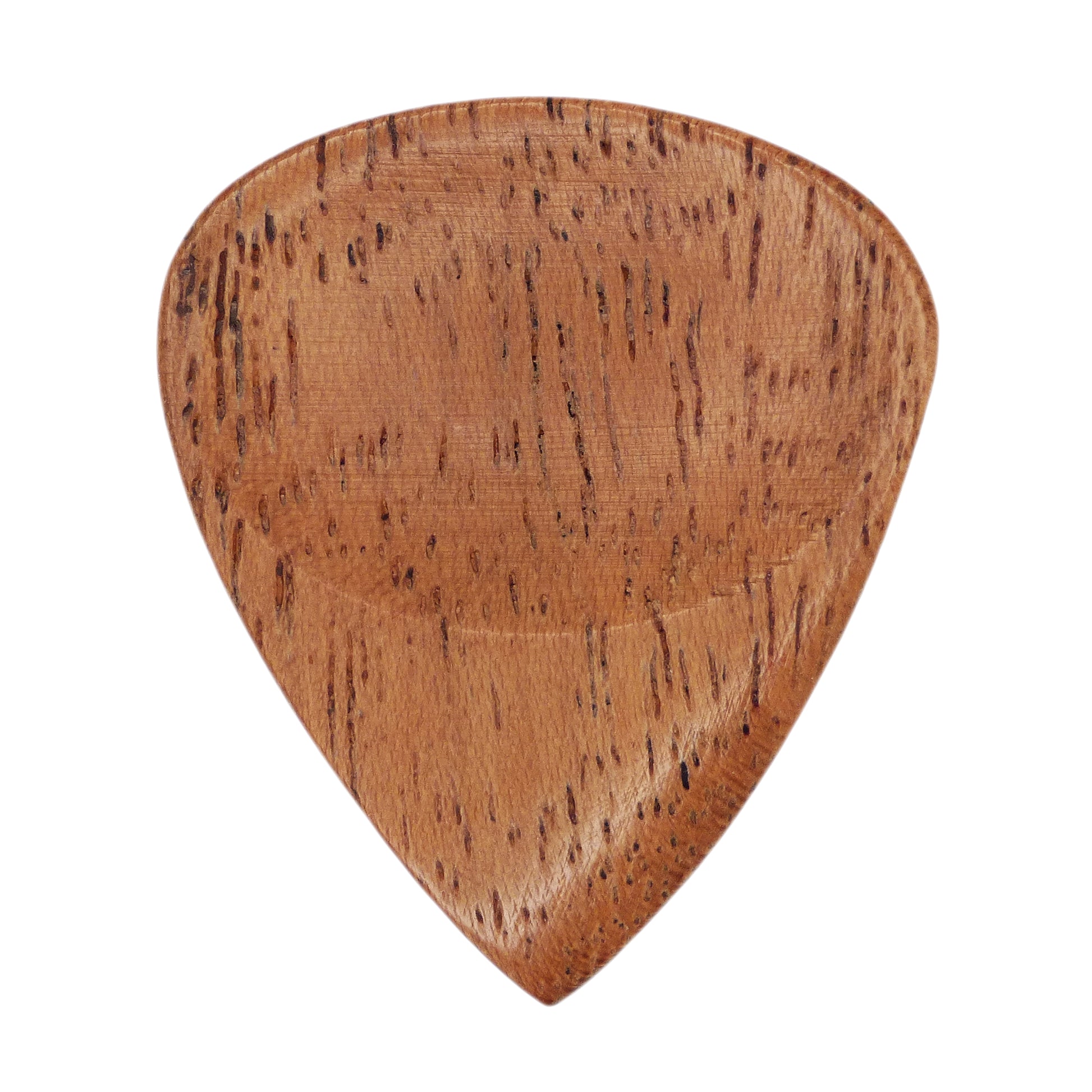Gum Arabic Wood Guitar Or Bass Pick - 3.0 mm Ultra Heavy Gauge - 351 Groove Shape - Natural Finish Handmade Specialty Exotic Plectrum
Gum Arabic Wood Guitar Or Bass Pick - 3.0 mm Ultra Heavy Gauge - 351 Groove Shape - Natural Finish Handmade Specialty Exotic Plectrum
Regular price
$4.99 USD
Regular price
$9.99 USD
Sale price
$4.99 USD
Unit price
per
Shipping calculated at checkout.
Couldn't load pickup availability
Gum Arabic Wood Guitar Or Bass Pick - 3.0 mm Ultra Heavy Gauge - 351 Groove Shape - Natural Finish Handmade Specialty Exotic Plectrum
These natural Gum Arabic Wood plectrums are a great addition to your exotic guitar pick collection. Each pick is handcrafted and buffed to a smooth finish. These exotic plectrums can be used for any stringed instrument, and sound great for acoustic or electric guitar players. These picks feel very smooth and comfortable in the hand and feature a thumb indentation on one side and a longer thinner groove on the other to assist the player in holding on to them.
These picks have a very attractive aesthetic and come in a natural finish which showcases the wood used and its organic beauty. Because these are a handmade product each one is unique and will vary in appearance, as well as slightly in size and thickness. These plectrums are a very thick heavy gauge and measure approximately 3mm where you grip the pick, and are beveled down at the tip.
Start exploring new tones with these exotic Gum Arabic Wood guitar picks today because the simplest and most inexpensive way to change your tone is to change your pick.
Specifications:
• Thickness: Approximately 3mm where you grip the pick, and beveled down at the tip
• Color: Gum Arabic Wood
• Material: Gum Arabic Wood
• Size: Approximately 30mm x 25mm x 3mm
• Shape: Standard 351 pick shape with grooves on both sides
• Blank guitar picks, no printing or logo
About The Material These Picks Are Made From:
Wooden plectrums have been used traditionally throughout the world since the dawn of stringed instruments millennia ago.
The Gum Arabic tree, scientific name Vachellia Nilotica or Acacia Nilotica, belongs to the Vachellia genus of trees and shrubs. The Gum Arabic tree is found natively in Africa, the Middle East, and India. Gum Arabic wood is known for its beautiful and distinctive grain, as well as its durability. The tree got its name because the sap from the tree could be used to make gum which was used in a variety of ways as a natural binding agent, and it was introduced to the world through Arab trade networks. The Gum Arabic tree was traditionally considered a species of Acacia tree, but genetic studies lead botanists to split Acacias into more than one genus in 2005. Many plants in the Vachellia genus are still referred to as Acacias in common use because of tradition and the fact that they share the same traits as other Acacias.
Aesthetically, Gum Arabic typically has a light and attractive grain to it, and a slight reddish brown hue. Gum Arabic wood is not widely commercially harvested for its wood, so it is usually only found being used in boutique or specialty products. Along with much of the Acacia genus, Gum Arabic is one of the hardest woods in the world, and is generally harder than European white oak, hickory, walnut, or bamboo. This hardness and durability make it an excellent wood for making guitar picks.
Besides Vachellia Nilotica there are several related species of tree that are colloquially referred to as Gum Arabic trees, as well as by other names such as Babul, Thorn Mimosa, Egyptian Acacia, or Thorny Acacia. One of the main characteristics they all share is producing the desirable sap they are named after.
More important commercially than the timber itself, the sap has been a valuable trade product since ancient times. It makes an excellent natural binding agent and has been used in everything from natural glues, to paints, to foods, and as a traditional medicinal remedy. To this day it is used in candies, soft drinks, cosmetics, and even as the glue on lickable postage stamps.
Its dual use as a gum producing tree, which can then be harvested for the lumber once sap production dwindles, makes it an environmentally friendly and sustainable species of wood. Gum Arabic wood has traditionally been used for a wide variety of purposes including musical instruments, tools, boat building, furniture, decorative wood objects, and more.
These natural Gum Arabic Wood plectrums are a great addition to your exotic guitar pick collection. Each pick is handcrafted and buffed to a smooth finish. These exotic plectrums can be used for any stringed instrument, and sound great for acoustic or electric guitar players. These picks feel very smooth and comfortable in the hand and feature a thumb indentation on one side and a longer thinner groove on the other to assist the player in holding on to them.
These picks have a very attractive aesthetic and come in a natural finish which showcases the wood used and its organic beauty. Because these are a handmade product each one is unique and will vary in appearance, as well as slightly in size and thickness. These plectrums are a very thick heavy gauge and measure approximately 3mm where you grip the pick, and are beveled down at the tip.
Start exploring new tones with these exotic Gum Arabic Wood guitar picks today because the simplest and most inexpensive way to change your tone is to change your pick.
Specifications:
• Thickness: Approximately 3mm where you grip the pick, and beveled down at the tip
• Color: Gum Arabic Wood
• Material: Gum Arabic Wood
• Size: Approximately 30mm x 25mm x 3mm
• Shape: Standard 351 pick shape with grooves on both sides
• Blank guitar picks, no printing or logo
About The Material These Picks Are Made From:
Wooden plectrums have been used traditionally throughout the world since the dawn of stringed instruments millennia ago.
The Gum Arabic tree, scientific name Vachellia Nilotica or Acacia Nilotica, belongs to the Vachellia genus of trees and shrubs. The Gum Arabic tree is found natively in Africa, the Middle East, and India. Gum Arabic wood is known for its beautiful and distinctive grain, as well as its durability. The tree got its name because the sap from the tree could be used to make gum which was used in a variety of ways as a natural binding agent, and it was introduced to the world through Arab trade networks. The Gum Arabic tree was traditionally considered a species of Acacia tree, but genetic studies lead botanists to split Acacias into more than one genus in 2005. Many plants in the Vachellia genus are still referred to as Acacias in common use because of tradition and the fact that they share the same traits as other Acacias.
Aesthetically, Gum Arabic typically has a light and attractive grain to it, and a slight reddish brown hue. Gum Arabic wood is not widely commercially harvested for its wood, so it is usually only found being used in boutique or specialty products. Along with much of the Acacia genus, Gum Arabic is one of the hardest woods in the world, and is generally harder than European white oak, hickory, walnut, or bamboo. This hardness and durability make it an excellent wood for making guitar picks.
Besides Vachellia Nilotica there are several related species of tree that are colloquially referred to as Gum Arabic trees, as well as by other names such as Babul, Thorn Mimosa, Egyptian Acacia, or Thorny Acacia. One of the main characteristics they all share is producing the desirable sap they are named after.
More important commercially than the timber itself, the sap has been a valuable trade product since ancient times. It makes an excellent natural binding agent and has been used in everything from natural glues, to paints, to foods, and as a traditional medicinal remedy. To this day it is used in candies, soft drinks, cosmetics, and even as the glue on lickable postage stamps.
Its dual use as a gum producing tree, which can then be harvested for the lumber once sap production dwindles, makes it an environmentally friendly and sustainable species of wood. Gum Arabic wood has traditionally been used for a wide variety of purposes including musical instruments, tools, boat building, furniture, decorative wood objects, and more.


